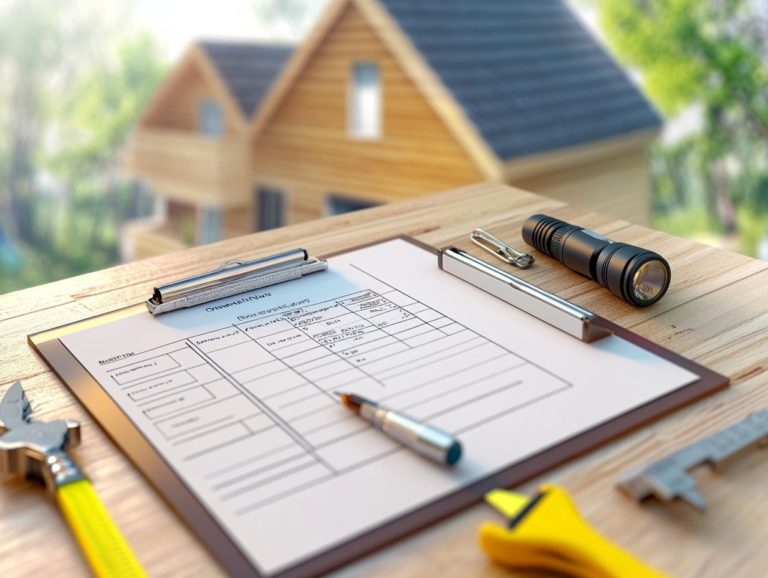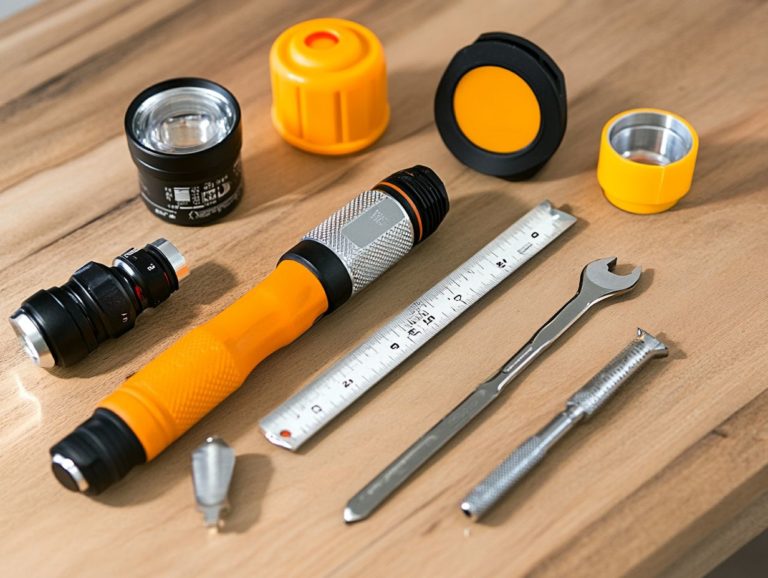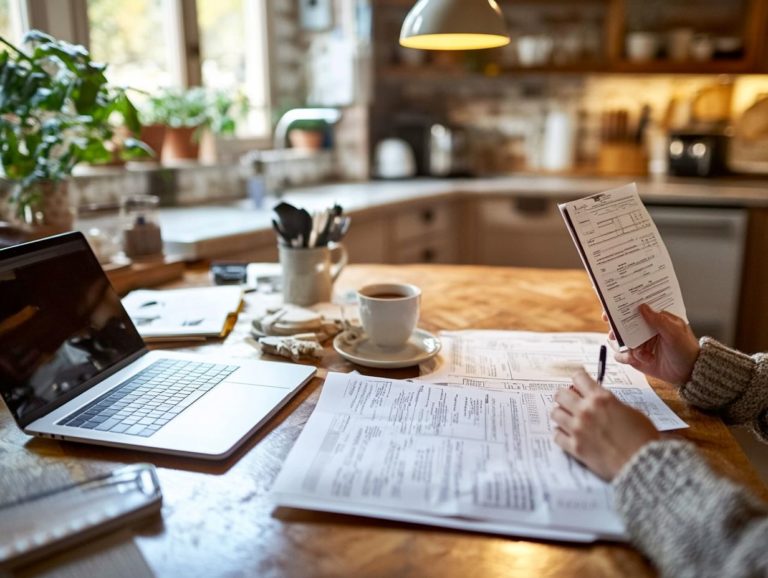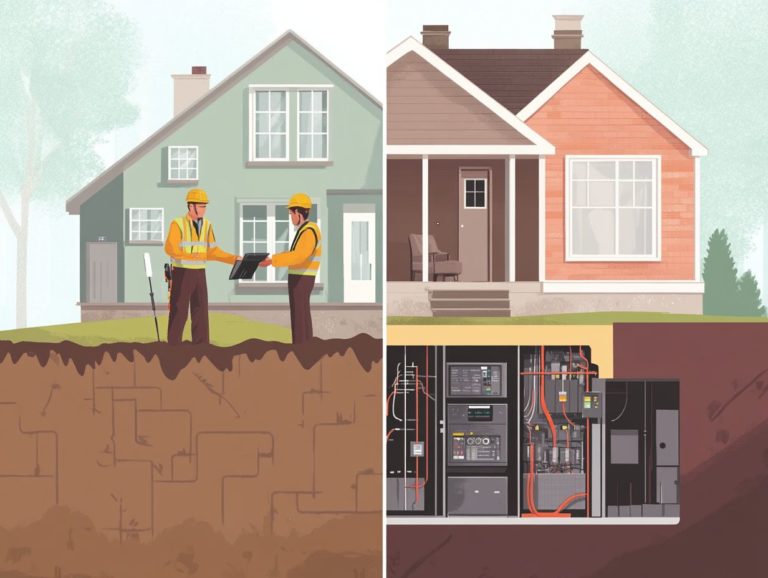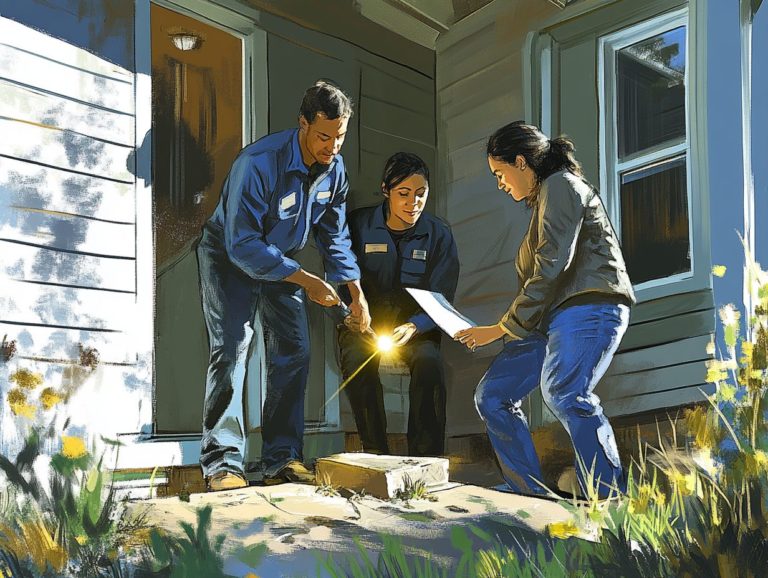How to Choose an Inspector for Your Home
Choosing the right home inspector is an important step in your home buying journey. Their expertise can reveal hidden issues, helping you make an informed investment.
This guide will help you understand the role of home inspectors, the key qualities to look for, and the right questions to ask potential candidates.
You ll also learn how to research and compare inspectors, along with tips for getting your home ready for inspection. Don t wait too long to choose the right inspector your future home depends on it!
Let s dive in!
Contents
- Key Takeaways:
- Understanding the Role of a Home Inspector
- Qualities to Look for in a Home Inspector
- Questions to Ask Potential Inspectors
- Researching and Comparing Inspectors
- Preparing for the Inspection
- Frequently Asked Questions
- What should I look for when choosing an inspector for my home?
- How do I know if an inspector is licensed and certified?
- Is it necessary to hire a home inspector?
- Can I use my real estate agent’s recommended inspector?
- What types of inspections should I consider for my home?
- How much should I expect to pay for a home inspection?
Key Takeaways:
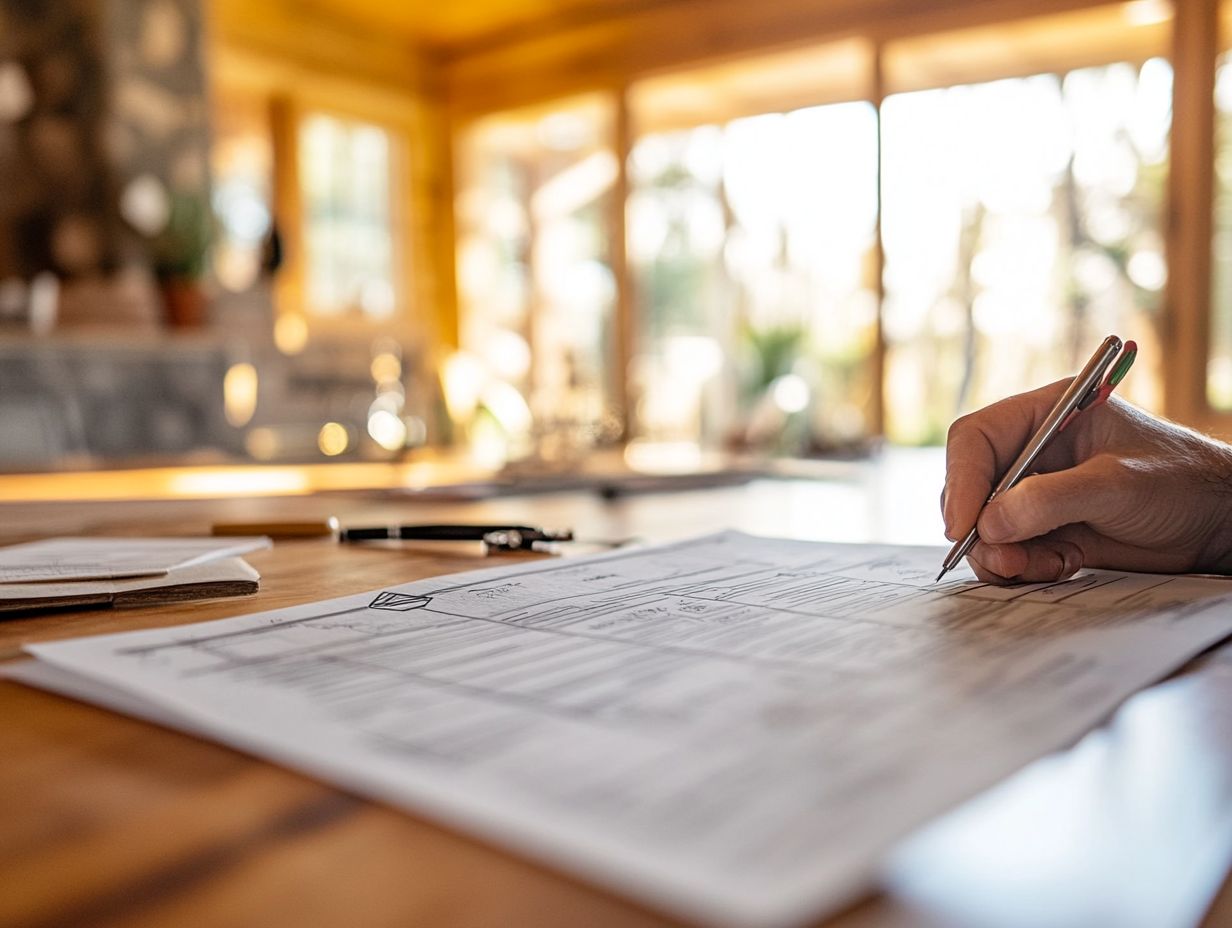
Understand the role of a home inspector and their responsibilities before hiring one. Look for experienced and certified inspectors who pay attention to detail and provide thorough reports. For guidance on selecting the best option, check out how to choose the right home inspector for you. Ask potential inspectors about their experience, training, and references. Finally, research and compare their services and reviews before making a decision.
Understanding the Role of a Home Inspector
A home inspector is essential for anyone involved in a real estate transaction. They guide both buyers and sellers through the home buying journey.
A certified home inspector evaluates a property for structural problems, mechanical issues, and hidden concerns that could affect its value. This thorough process allows buyers to make informed decisions and helps sellers anticipate repairs based on the inspection report.
What Does a Home Inspector Do?
A home inspector evaluates a property for mechanical issues, structural concerns, and potential hidden problems that could affect its value. They check the roof for loose shingles, inspect the basement for moisture, and look at the exterior for damage.
The inspection report you receive is a vital document. It highlights the home s current condition and outlines any major repairs needed. This allows you to make informed decisions and negotiate effectively with sellers.
Qualities to Look for in a Home Inspector
When choosing a home inspector, focus on qualities that can impact your inspection results. Consider looking for how to choose the right inspector for your home, as experience, certifications, and attention to detail are crucial.
A certified inspector with a strong track record offers peace of mind. They have the training to find issues that may not be immediately visible. Verify their credentials and read reviews from trusted sources like the Better Business Bureau or Angi.
Experience and Certifications
Experience and certifications are key when selecting a home inspector. They reflect the inspector s expertise and commitment to high standards.
Look for inspectors with certifications from reputable organizations like the American Society of Home Inspectors. Additionally, checking references or reading client reviews can provide a clearer picture of their capabilities.
Don’t overlook the importance of continued education. A dedicated inspector regularly updates their skills to keep up with changing building codes and inspection techniques. This ensures you’re working with a knowledgeable professional.
Thoroughness and Attention to Detail

Thoroughness and attention to detail are crucial qualities for a home inspector. These traits help uncover hidden issues that might otherwise escape notice.
A meticulous inspection report showcases diligence. It ensures that potential hazards are effectively communicated to the homeowner.
For instance, in areas prone to moisture, a keen eye can spot early signs of mold growth. Ignoring this can lead to serious health concerns.
During radon inspections, a colorless and odorless gas that can be harmful, detecting even slight air quality abnormalities can be life-saving.
By examining the property for signs of pest infestations like droppings or structural damage from common pests such as termites or rodents inspectors provide invaluable insight. This helps homeowners make informed decisions, ultimately protecting their investment.
Questions to Ask Potential Inspectors
When interviewing potential home inspectors, asking the right questions is vital. You want to hire someone who is capable and trustworthy, especially regarding inspection fees and services. For more guidance, check out how to choose the best home inspector near you.
Key questions should cover qualifications like certifications and experience and their approach to inspections. Requesting sample reports will give you insights into their thoroughness.
Seeking references from previous clients can provide reassurance about their reliability.
Experience and Training
Experience and training are essential! They boost your skills and help you spot potential issues across various property types.
Ongoing training keeps you current with the latest codes and practices. This makes you more proficient in identifying hidden problems that could pose risks to future homeowners.
Your diverse background like construction or engineering enhances your perception. It provides unique insights into how different systems within a property interact, leading to thorough assessments.
Researching and Comparing Inspectors
Don’t wait! Researching and comparing home inspectors is crucial for making informed decisions. For more insights on selecting the best professional, check out how to choose the right inspector for your needs. Online reviews, recommendations, and inspection fees can guide your choices.
Using platforms like HomeAdvisor and Angi gives you valuable feedback from previous clients. This can help you identify reputable inspectors.
Understanding the costs of additional tests like radon, lead, or asbestos can also influence your overall decision.
Online Reviews and Recommendations
Online reviews and recommendations are key when selecting a home inspector. They provide firsthand accounts from previous clients that shape your expectations.
While navigating various platforms for insights, seek detailed and balanced feedback. Watch for recurring themes; consistent comments about punctuality or thoroughness can clarify what to expect.
Exploring ratings across different sites helps establish credibility. Checking the Better Business Bureau (BBB) for complaints can reveal potential red flags.
A clean BBB record often signals a reputable inspector, enabling you to make an informed choice for your home inspection needs.
Cost and Services Offered

When you re researching home inspectors, understanding inspection costs and available services is crucial for making an informed decision.
Inspectors typically charge a base fee that varies depending on the size and age of the property, as well as the region. This base fee usually covers essential inspections, including:
- Structural assessments
- Exterior evaluations
- Plumbing and drainage checks
- Roof inspections
Consider additional services, such as evaluating electrical systems or conducting pest infestation tests. These can uncover hidden issues that standard inspections might overlook.
Supplementary services enhance the overall value of the inspection and provide a more detailed understanding of the home s condition. This helps you avoid costly repairs in the future.
Preparing for the Inspection
Preparing for a home inspection is essential to ensure a seamless experience. This allows both buyers and sellers to anticipate the ins and outs of inspection day.
By taking proactive measures, like clearing areas for assessment and tackling minor repairs, you can create a more efficient inspection process.
Understanding the inspector’s approach improves your understanding of the detailed inspection report that is sure to follow.
What to Expect on Inspection Day
On inspection day, expect the home inspector to conduct a thorough evaluation of your property. They will meticulously focus on various mechanical systems, structural concerns, and potential hidden issues.
This thorough process typically kicks off in the morning and may extend for several hours. During this time, the inspector will scrutinize vital components such as plumbing, electrical systems, roof conditions, and heating, ventilation, and air conditioning (HVAC) units.
Be there to ask questions and clarify any findings on the spot. Gaining insight into these aspects is essential, as the inspector s observations will later be compiled into a detailed report.
This report will highlight significant issues and provide recommendations, ultimately serving as a valuable resource for your decision-making.
How to Prepare Your Home for Inspection
Preparing your home for inspection requires a thoughtful approach. This ensures the inspector can carry out their evaluation with efficiency and effectiveness.
You should consider crafting a comprehensive checklist to guide your preparation. Begin by decluttering your spaces; a tidy environment enhances visibility and provides easier access to critical areas.
It s prudent to take care of any minor repairs that might catch the inspector s eye, such as leaky faucets or cracked tiles. This prevents unnecessary red flags from being raised.
Additionally, ensuring that all areas of your home, including attics and basements, are easily accessible will facilitate a thorough inspection.
By addressing these tasks in advance, you can significantly improve your chances of a seamless evaluation process. Start preparing today for a smoother inspection!
Frequently Asked Questions
What should I look for when choosing an inspector for my home?
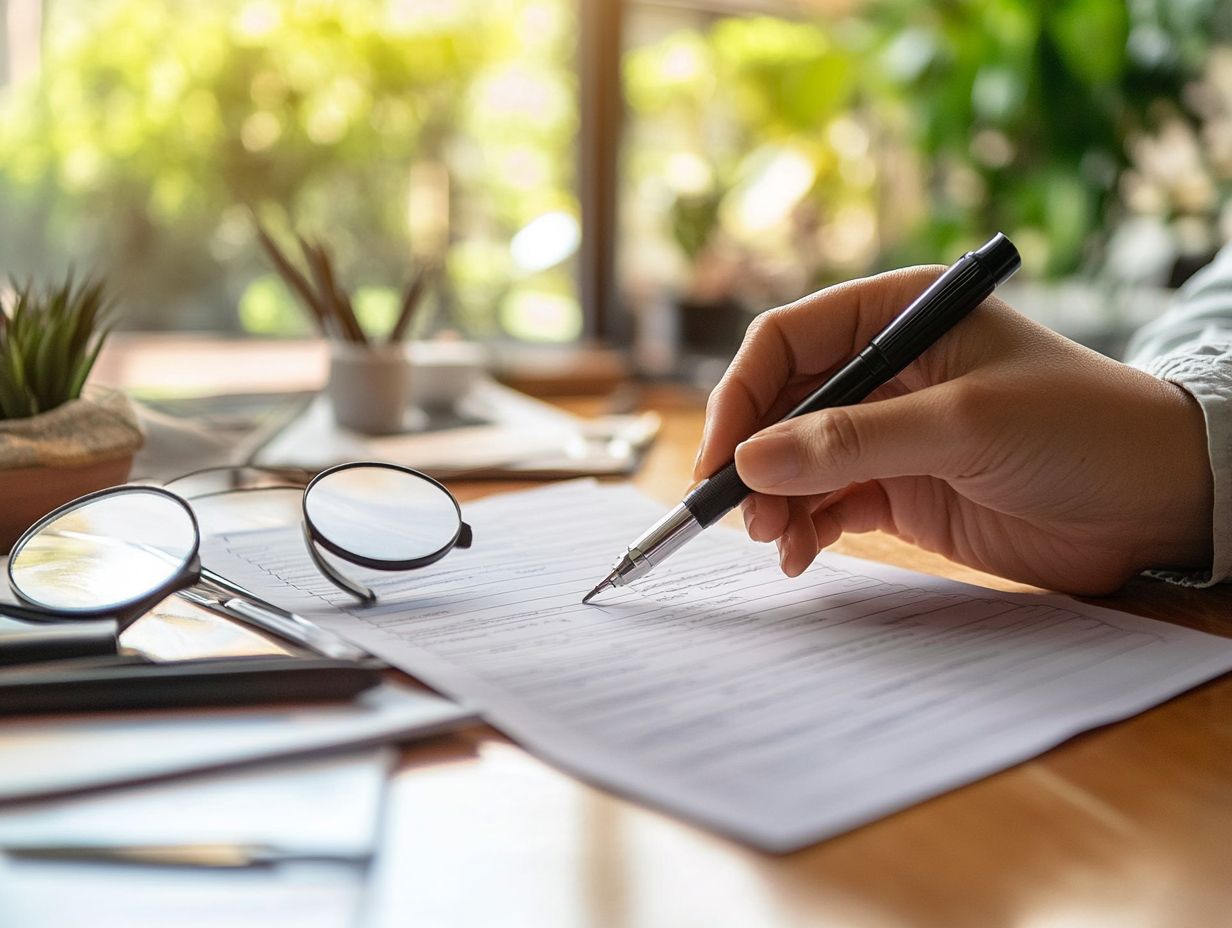
When choosing an inspector for your home, consider their qualifications, experience, and reputation. Look for someone who is licensed and certified, has extensive experience in the industry, and check out this guide on how to choose an inspector for your home to find professionals with positive reviews from previous clients.
How do I know if an inspector is licensed and certified?
You can check the inspector’s credentials with the state licensing board or professional association. They should provide proof of their license and any additional certifications they hold.
Is it necessary to hire a home inspector?
While it is not required, hiring a professional home inspector before purchasing a home is highly recommended. They can identify potential issues or defects that may be costly to repair in the future.
Can I use my real estate agent’s recommended inspector?
Your real estate agent may suggest an inspector. However, it’s crucial to do your own research and learn how to select a home inspector for your needs to ensure they are qualified and unbiased.
Choosing an inspector not linked to your agent helps prevent conflicts of interest.
What types of inspections should I consider for my home?
Common home inspections include general inspections, pest inspections, and radon testing, which checks for harmful gas buildup.
Depending on your home’s age and location, consider specialized inspections for issues like mold or asbestos.
How much should I expect to pay for a home inspection?
The cost of a home inspection varies by size, location, and type of inspection. On average, basic inspections range from $300 to $500.
Get quotes from multiple inspectors to compare their services and ensure you get the best value!

